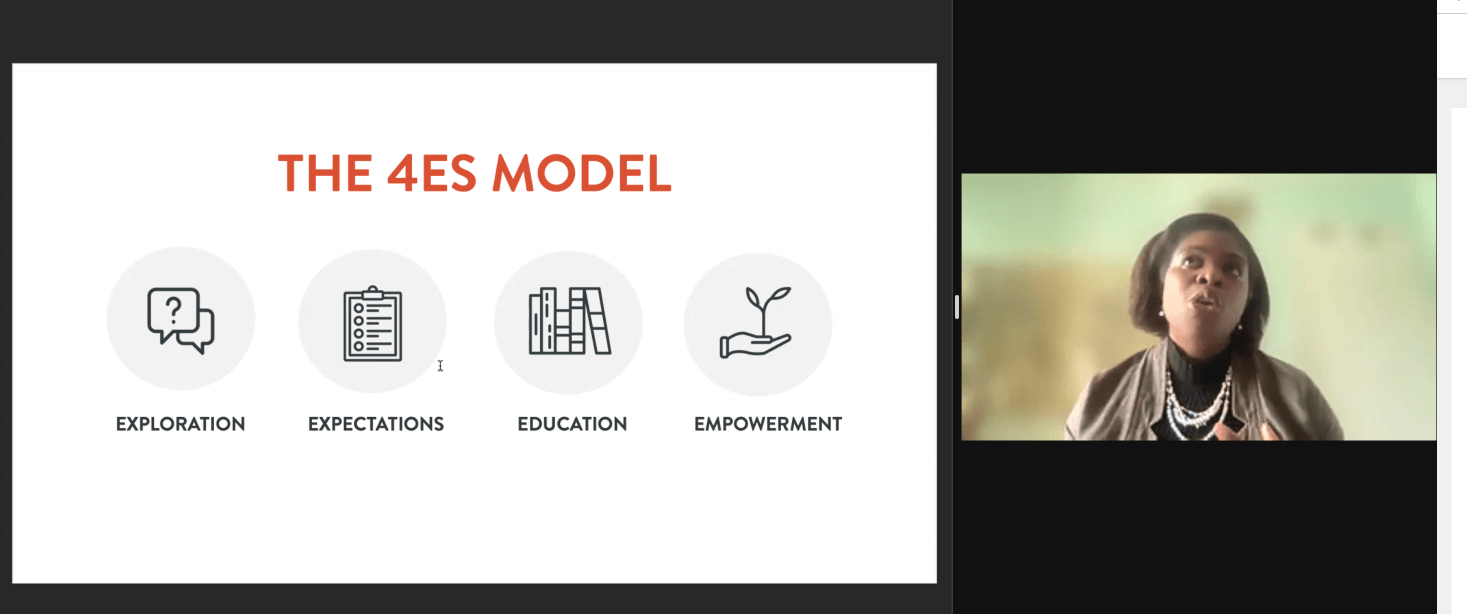Five Ways to Center Equity in Family Engagement
Equity-deserving families have faced systemic barriers when accessing services and programs, whether it’s in education, employment, housing or mental health. There’s still more work to be done in the youth sector when it comes to serving the needs of families and creating sufficient space for parents/caregivers to share their experiences and be heard, without being invalidated by assumptions or biases. It is crucial for youth workers to support equity-deserving families in navigating a system of institutionalized racism and oppression. YouthREX’s recent webinar, Centering Equity in Family Engagement, has shed light on practices that could support this work.
The event consisted of insightful panel conversations featuring representatives of different programs serving youth and their families, preceded by a keynote presentation from Dr. Carol Wade, a member of YouthREX’s Academic Network with over 20 years of experience in the child welfare sector and in social work education. The 4Es Framework* was central to understanding the principles discussed during the webinar – Exploration, Expectation, Education, and Empowerment. Dr. Wade emphasized this framework as a knowledge-to-practice tool in working with equity-deserving families, and explained how this tool corresponded with her research on historical trauma and current-day parenting.
There needs to be a change in the ways that youth services approach family engagement in order to be more inclusive of diverse cultural views and stories, and to dismantle power imbalances between practitioners and families – all of which would contribute to a stronger support network for families of Black, Indigenous, and other racialized youth, with critical consideration of the intersections of race, gender, sexual identity, and ability. Here are five main takeaways from the webinar in relation to the 4Es Framework that can best address the gaps in centering equity in family engagement:

Dr. Carol Wade delivers a keynote presentation, Strengthening Engagement with Families.
1) Empower diverse youth and families’ voices by listening to their stories.
It is important to centre the voices of families who may feel ignored or undervalued, or judged for their parenting/caregiving. Oppressive systems make it difficult for many families to feel heard and access appropriate resources. We need to reassure both young people and their families that their lived experiences are valid, and that they have the agency to overcome these challenges and make changes. This speaks to Empowerment – supporting families to feel valuable and promoting all forms of their wellbeing.
2) Challenge your cultural biases and assumptions.
Biases can be embedded in personal views on race, gender, class, sexual orientation, and ability, and are influenced by Eurocentric perspectives that are reflected in institutions. Oftentimes, these unconscious biases can hinder the effectiveness of youth and family services because of assumptions that practitioners may have about parents’ competency or range of knowledge, or the validity of youth’s experiences. We need to check our biases when approaching equity-deserving families, provide youth with a political consciousness, and recognize the value in families’ cultural wealth, which they use to manage systems of exclusion. This correlates with Exploration – supporting and understanding families without judgement or assumptions.
3) Celebrate equity-deserving families’ strengths and achievements.
Oppressive institutions tend to emphasize deficits and weaknesses. This can even be an unconscious practice of focusing on the hardships or disadvantages faced by equity-deserving families, which belittle their strengths and accomplishments. For example, if schools were more encouraging of Black students’ potential, then more Black youth could be made aware of their worth, since their self-worth may be influenced by how they are treated (this is true for parents/caregivers, too). This ties into Empowerment – focusing on families’ achievements and celebrating their successes.
4) Work in partnership with equity-deserving families to build stronger relationships.
When working with parents/caregivers, we should be more mindful of the power imbalances that might enable practitioners to perceive parents/caregivers as ‘lesser than’ because of differences in knowledge or practice. We need to remember that equity-deserving families do not need to be saved, but, rather, should be regarded as equal, valued partners and contributors, which connects to Expectation.
Partnerships are pivotal because youth workers should support parents/caregivers in being their partners in work with youth. Youth workers should engage parents in community partnerships, in order to promote access to resources and networks, and advocate for and with them, as parents have been historically excluded, all of which connects to Education.
5) Increase services that recognize how intersecting identities impact youth and their families.
Youth programs should incorporate services geared to youth and families of intersecting identities, as not enough attention has been given to these intersectionalities. Lorraine Gale from the Children’s Aid Society of Toronto spoke to the misunderstandings around Black, Indigenous, and other racialized queer youth, and how this lack of support and acceptance can negatively impact their health and wellbeing. Clovis Grant also has experience with the lack of attention paid to the intersection of race and ability. He and his wife run their own support group for Black families of youth with different abilities in an effort to create a space for this intersection of identities. Youth services should work to support equity-deserving families with consideration to youth and their intersectionalities – race, age, sexual orientation, ability, and more – as it can have a significant impact on their wellbeing. All of the Es from the 4Es model can be applied to this practice.
Supporting equity-deserving youth means supporting their families, because strong and healthy child-parent/caregiver relationships should foster support for youth so that they can be encouraged to move forward in their lives and succeed. Putting these practices into action can really guide youth workers to centre equity in their work when intentionally engaging diverse families with intersecting needs, especially in the face of ongoing exclusion and marginalization.
*You can learn more in YouthREX’s Factsheet, The 4Es Framework for Culturally Relevant Family Support & Engagement, which is adapted from the work of Dr. Iheoma U. Iruka in Being Black is Not a Risk Factor: A Strengths-Based Look at the State of the Black Child and developed in consultation with Dr. Wade.


